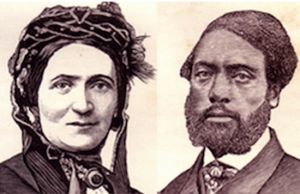
Ellen Craft (disguised)
The lives of Ellen and William Craft are celebrated on this date. They were two Black abolitionists who were known for William's autobiographical slave narrative describing the couple's dramatic escape from slavery.
William and Ellen Craft's self-liberation is one of the most remarkable escapes ever recorded in a historic slave narrative. Ellen was born in 1826 in Clinton, GA, to a biracial slave woman and her white-American master, and was so light-skinned that she was often mistaken for a member of her father's family. This infuriated her mistress and, as a result, at age 11, Ellen was given as a wedding gift to a daughter who lived in Macon. There she met William, whom she married in 1846.
Two years later, the Crafts began to devise their escape plan, which involved Ellen posing as a white slaveholder traveling with "his" slave, William. This required several levels of deception. She cut her hair, changed her walk, and wrapped her jaw in bandages to disguise her lack of a beard. To hide her illiteracy, she wrapped her right arm in a sling to have a ready excuse for being unable to sign papers, and Craft explained all of the bandages by claiming to be an invalid traveling north to receive medical care. In this manner, the Crafts traveled from Georgia to Pennsylvania by train, steamer, and ferry without being discovered.
They arrived in Philadelphia on Christmas Day, 1848. The Crafts moved to Boston and began traveling as antislavery lecturers. The passage of the Fugitive Slave Law in 1850, however, put their freedom in danger. In November of that year, they fled to England. "Running a Thousand Miles for Freedom," William's autobiography, was published in London in 1860. In 1868, following the American Civil War, the Crafts returned to the United States with two of their children and settled in Ways Station, Georgia, near Savannah.
Ellen Craft died in 1891 and, at her request, was buried under her favorite tree on their land. William Craft eventually moved to Charleston, SC, where he died in 1900. The Crafts' story remains a testimonial to the intelligence, cunning, and courage many Black slaves brought to their determination to be free.
History of American Slavery
by Duncan Clarke JG Press
Copyright 1998 PRC Publishing Ltd.
ISBN 1 57215 256 7
